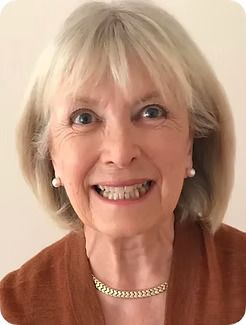
Adopting an orphan condition – Charles Bonnet Syndrome
Judith Potts, Founder and Trustee of Esme's Umbrella
- Person-centred care
What is Charles Bonnet Syndrome?
When a child or adult loses a variable amount of sight, Charles Bonnet Syndrome (CBS) can develop. It causes vivid, silent, visual hallucinations which range from beautiful to terrifying – but CBS is not a mental health condition. The brain – left with nothing to interpret – fires up and creates its own images.
The loss of sight can be caused by eye disease, stroke, cancer, accident, diabetes, MS, a brain injury or another condition which attacks the optic nerve.
There are an estimated 1 million people in the UK who live with CBS. Yet, for nearly 300 years it has been a well-kept secret. There has been no information, no support, no awareness. The NHS has not been – and still is not – working for the CBS community.
CBS was an orphan condition, which I adopted.
Why did I adopt CBS?
Glaucoma was stealthily removing the sight of my 94-year-old Mother, Esme. Her independence flourished until the day she described the faceless people sitting on her sofa, the child in Edwardian costume who followed her everywhere and the hideous, gargoyle-like creature which jumped from table to chair. Sometimes whole scenes appeared.
Even when I discovered what was causing these ‘visions’, her ophthalmologist refused to discuss CBS, her GP falsely diagnosed dementia, and her optometrist had never heard of it.
I created Esme’s Umbrella in 2015 and it became a charity in 2021.
Why was CBS a secret?
It is clear that people who develop CBS, self-diagnose incorrectly and the stigma of a mental health condition prevents them from confiding in anyone. Consequently, doctors assumed that CBS was a very rare condition, only found in the elderly and that it disappeared in 18 months.
It was Professor Dominic ffytche of King’s College London who conducted the first piece of CBS research, opened the secret and dispelled these myths.
Living with CBS is distressing and debilitating. Isolation, stress, tiredness and fever make it worse, as do various medications. Living in a world of hallucinations brings a different kind of loneliness and constant episodes can lead to anxiety and depression. Distraction techniques temporarily quell the visual hallucinations for some people, but everyone’s experience of CBS is different.
What are the wishes of the CBS Community?
If I could wave a magic wand, I would grant the following:
- A CBS-specific drug or treatment.
- CBS doctors, in the eye or neurological clinics, who can not only give a definitive diagnosis but will also explain CBS before it develops – thus preventing the fear of a mental health issue.
- GPS with an understanding of CBS and its impact on the family as well as the person. Being believed and supported is paramount.
- CBS Nurses for adults, similar to Breast Cancer Now’s Specialist Nurses.
- Equivalent Specialist Nurses for children, young people and their families or caregivers, who would liaise with teachers.
- The WHO – who listened and gave CBS its first-ever code in ICD 11 (9D56) – must remove the word ‘temporary’ from the description. CBS is not always temporary.
Research
With greater awareness achieved, research is growing with the UK leading the world. I am enormously proud of this ground-breaking piece of paediatric CBS research: https://adc.bmj.com/content/early/2025/01/09/archdischild-2024-327811
Lastly…
Charles Bonnet documented the hallucinations of his grandfather, Charles Lullin. He described Lullin as being ‘of sound mind’, giving the cause as loss of sight from cataracts in both eyes – and not from a psychiatric disorder.
That was in 1760. How do we persuade the NHS – which has ignored CBS for so long – to take up its reins of responsibility in 2025? Achieving this would be the best present for my 76th birthday in May.
judith@charlesbonnetsyndrome.uk Judith Potts